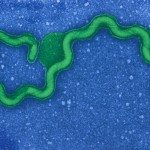Lien vers Pubmed [PMID] – 32632855
Lien DOI – 10.1007/978-1-0716-0459-5_2
Methods Mol. Biol. 2020 ; 2134(): 11-21
With the advent of whole-genome sequencing (WGS), comparative analysis has led to the use of core genome MLST (cgMLST) schemes for the high-resolution reproducible typing of bacterial isolates. In cgMLST, hundreds of loci are used for gene-by-gene comparisons of assembled genomes for studying the genetic diversity of clinically important pathogens. Combination of the cgMLST data and metadata of the isolates is useful for epidemiological investigations.Here we present a cgMLST scheme for the high-resolution typing of isolates from the whole Leptospira genus, enabling identification at the level of species, clades, clonal groups, and sequence types. We show several examples how the cgMLST Leptospira database, which is a publicly available web-based database, can be used for the analyses of WGS data of Leptospira isolates. This effort was undertaken in order to facilitate international collaborations and support the global surveillance of leptospirosis.

